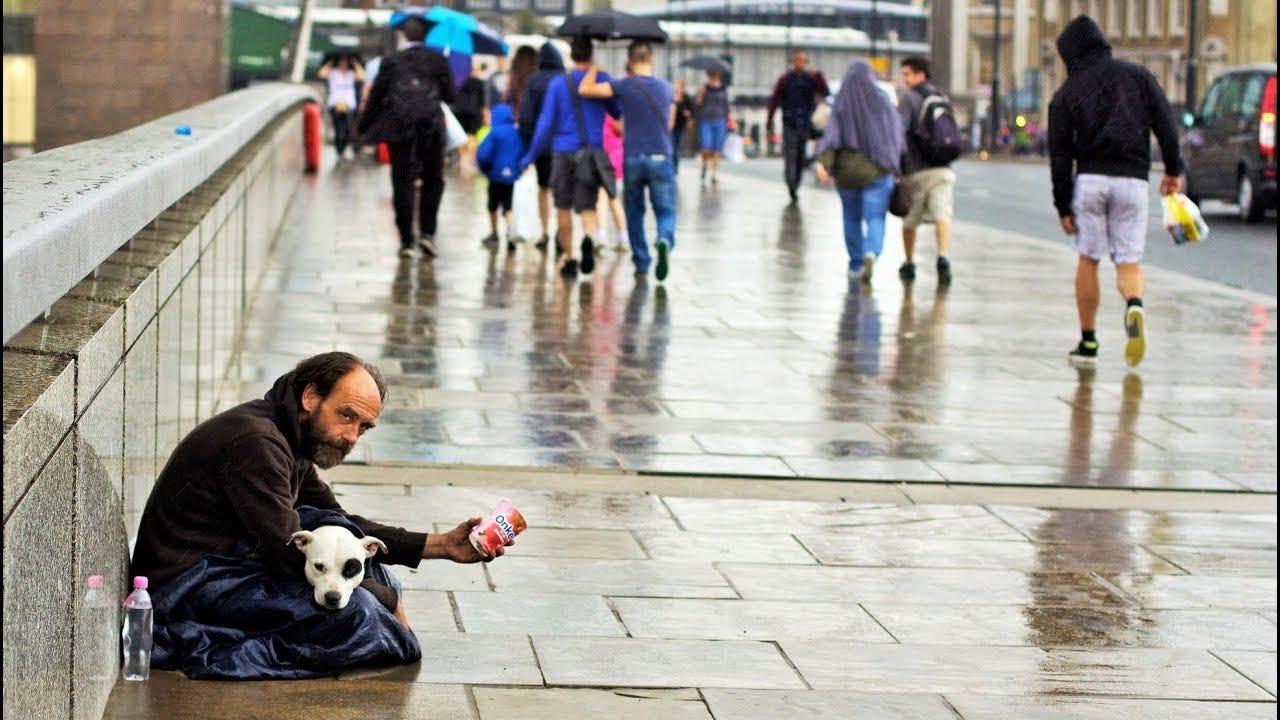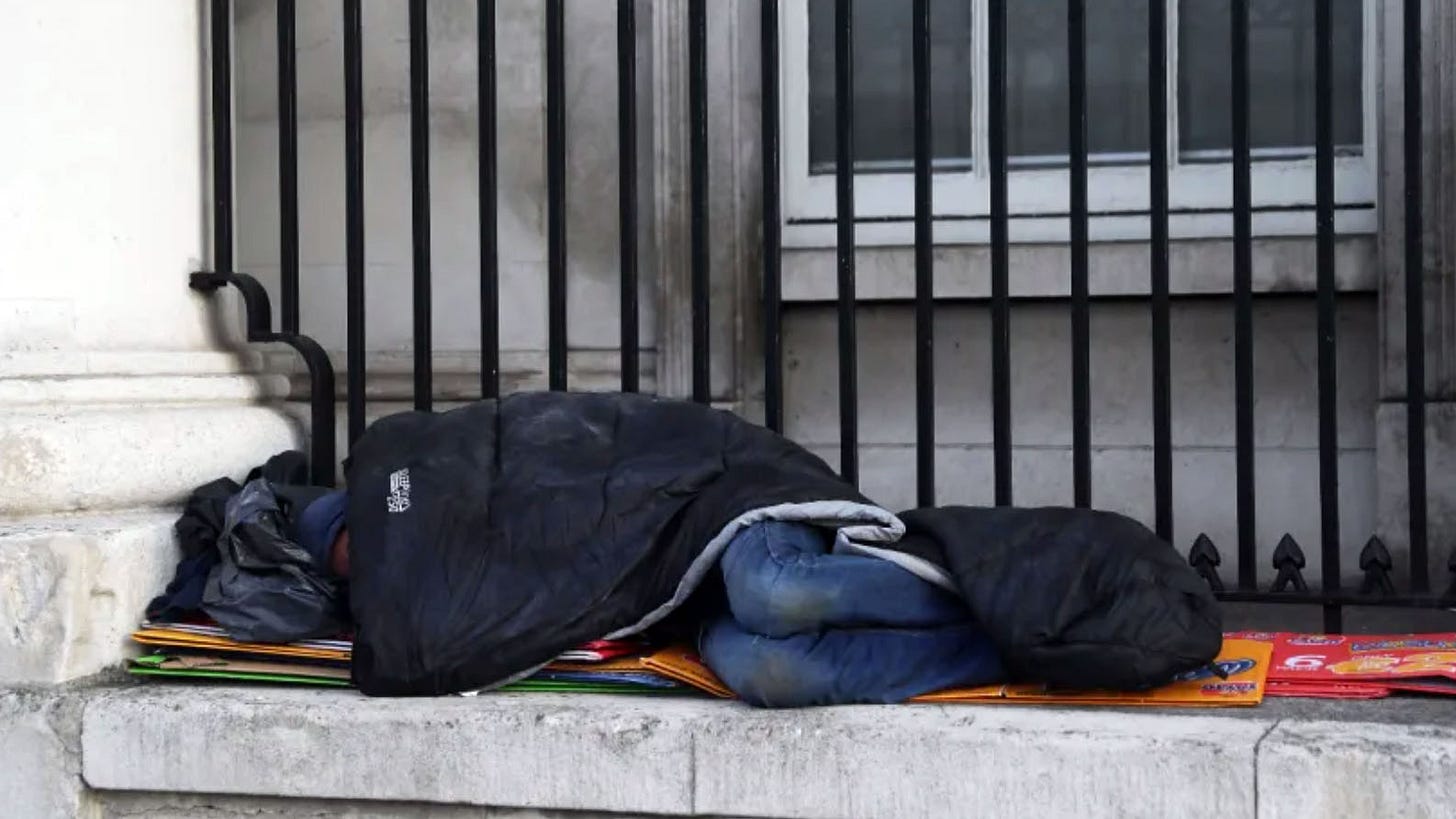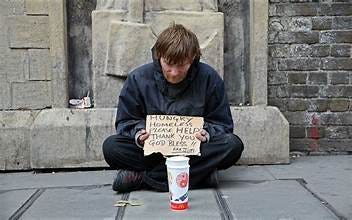Homelessness in London Surges, While Passage of the Criminal Justice Bill Looms
By Stephen Wilson, one of our reporters abroad
Khaleel has a hard life. After his aunt he had been staying with fell ill, he was forced to leave. He had nowhere to go, so he slept overnight in his car. The 26-year-old who works in a restaurant stated, “I was bad, I felt hopeless. The council wouldn't help me, and I didn't know what to do. I found the best place to park for me was the service station because people tend to sleep there and have access to toilets and showers.” Fortunately, a concerned security man noticed how upset Khaleel was and gave him the address of a charity 'The Single Homeless Project.' However, Khaleel still cannot find affordable permanent accommodation. He feels he is up against a brick wall.
Khaleel is just one of the homeless out of London's 167,469. The London Council estimates that approximately 1 in 50 Londoners have no home. Those sleeping rough no longer live in the notorious cardboard cities of the 1980's but more often dwell in tents. One such conspicuous tent lies on the Embankment of the River Thames where you are offered a scenic view of the Houses of Parliament. Other homeless live on boats around the canals, in squats, hostels, and bed and breakfast hotels. Those who live in tents are vulnerable to criminals who ransack and assault them.
If criminals don't disturb the homeless, it is common for the police to constantly harass them.
Note that this type of harassment is likely to increase with the imminent passage of the Criminal Justice Bill whose draconian laws further criminalize homelessness with steep fines and imprisonment.
In historical terms, London, with its promise of adventure—and advantages in unprecedented job opportunities and wealth—has always acted as a magnet for people in England as well as from overseas. The historian Roy Porter stated that in the 18th Century “London proved an irresistible honeypot for the young, offering work, money and excitement, or anonymity and escape.” Practically anyone seeking fame, fortune or influence set their sights on London. Porter states that “It was the powerhouse of politics, law, fashion and the art and sciences {the Royal Society of London dated from 1660 {the forge of luxury industry}, the capital of finances {the Bank of England had been founded in 1694}, and the greatest port for overseas trade” {See pages 38 to 41 of Roy Porter's “English Society in the 18th Century,” 1991, London and New York: Penguin Books}.
In addition, migrants and people from all over the United Kingdom still head to London seeking work. London has represented a reprieve from the deindustrialized ghost towns ruined by the poverty and unemployment which followed during the dark years of the 1980's and 1990's.
It is easy to see why London still attracts so many migrants looking for work. The city of 8.5 million is one of the main financial centers in Europe and provides many opportunities for casual work. But although it might be easy to obtain work, finding a home can be a miraculous feat. One estimate suggests renting a room has risen from a staggering 951 pounds a month in 2023 to a current rate of 995 Pounds! But some other surveys suggest this is a vast underestimate. The Property Website Right Move claims the average monthly rent in Britain has risen to a 2633 pounds in London and 1291 Pounds outside London.
Whatever the true cost, the average Londoner can end up paying over half his salary in rent. And those who rent can face eviction at any moment under no fault eviction laws.
Despite the huge cost of rent, people still come to London. Many seem inspired by an image of London at odds with harsh reality. They imagine a city where people are wholly polite, pleasant, tolerant, and fair-minded. They might contrast this with the awful experiences of dreadful poverty and abuse in the countries they are fleeing from. While London certainly has many merits, an encounter with the harsh reality can swiftly shatter many illusions. They might find not everyone is so polite and can be hostile to their presence. Migrants can face resentment and racism which is stirred up by the mass media as well as the government seeking a scapegoat.
London is no longer as alluring as before Britain withdrew from the European Union. Now it has become increasingly difficult for anyone to obtain legal permission to work in London as well as study. Following Brexit, many Firms, foreign students and potential workers no longer see the attraction of coming to London. Many prefer to go to the more easy-going Ireland where visas and work permits are easier to attain. Following Britain's exit from Europe, Britain's role as a financial and commercial center in Europe has been severely dented.
The Government's promise to abolish the No Fault Eviction Law and end rough sleeping by the end of this year now seems hollow. As rents sour, wages stagnate and landlords step up evictions, the charity The Single Homeless Project warns that as many as 18,000 Londoners could face homelessness. They claim that one London tenant is at risk of losing their home every five minutes.
The Conservative government hopes the problem will sort itself out or just gradually go away. Homelessness is viewed as an unwanted nuisance rather than an urgent emergency. The fact that in England 145,800 children are living in temporary accommodation fails to move the Government. They would like to wish the homeless away rather than take decisive action.
“As I was going up the stair,
I met a man who wasn't there,
He wasn't there again today.
I do so wish he'd go away.”
Unfortunately, homelessness can't be wished away. Khaleel Siddique and others need urgent help. They have dignity and dreams. Khaleel dreams of becoming an electrician. He states, “I want to put this experience behind me and get on with my life now. I don't want to be a burden to anyone. I can stand on my own two feet.”
Let's hope Khaleel and others like him manage to escape their predicament and realize their dreams.
The mean hostile environment policies which have been fostered by the present Conservative government do not reflect the values and principles of most people in the United Kingdom. In fact, most Londoners sympathize with the underdog, believe in fair play, and don't support the bully and the braggart. Anyone who studies English proverbs, and the English language and literature quickly realizes that people in the United Kingdom are offended when they hear of cases of injustice where people are evicted on to the streets or are wrongfully imprisoned on false charges following the Post Office scandal.
Old sayings state that “You never kick a man when he is down,” cheaply insulting someone “Is below the belt” and “Let Sleeping dogs lie” should be a recommendation people follow to avoid conflict—ones which may indeed become serious and complicated ones to resolve.
The main heroes of the novels by Charles Dickens, Graham Greene, and Jane Austen are always stepping in to aid the underdog. It is this immense generosity of spirit which still inspires homeless advocates to keep fighting on.
In Trafalgar Square a fragile Lord Nelson stands, blind in one eye and with just one hand. These days, Nelson's worst enemy tends to be pigeon droppings. Along with London's Green Park, Westminster Abbey, Big Ben, and the British Museum, Nelson's column remains a regular tourist attraction. If you look carefully, you can notice the dark burn marks which left an indelible scar on the plinth of the column. This was due to Canadian soldiers celebrating the end of the First World War by lighting a bonfire there. Nelson once stated that “Every man must do his duty.” But now their duty is no longer to fight the French but homelessness.
We must continue to fight for the rights of the homeless and keep a keen eye on what is going to happen as a result of the Criminal Justice Bill. The bill’s draconian laws serve to further criminalize homelessness with steep fines and imprisonment.





